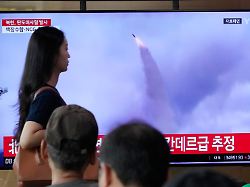Protests from Japan
North Korea responds with missiles at US nuclear submarine
07/19/2023, 8:16 am
In East Asia, events are currently unfolding. North Korea reacts angrily to the arrival of a US nuclear submarine in South Korea and fires more missiles. Not the first recently. Shortly before, a US soldier runs north from the demilitarized zone.
North Korea has responded to the arrival of a nuclear-powered US ballistic missile submarine in South Korea by launching two missiles, according to the Japanese and South Korean military. Both North Korean ballistic missiles appeared to have landed outside of Japan’s Exclusive Economic Zone, the Japanese Defense Ministry said. Japan protested against the rocket launches through diplomatic channels. South Korea’s General Staff (JCS) asked the North to stop such launches.
The events underscored the destabilizing effect of North Korea’s illegal weapons program, the US command in the Indo-Pacific said. The first missile reached an altitude of 50 kilometers and a range of 550 kilometers, the second also flew about 50 kilometers high and covered a distance of 600 kilometers, said Japanese Defense Minister Yasukazu Hamada.
The missile launches came about a week after North Korea tested its latest Hwasong-18 ICBM, which stayed in the air longer than any North Korean missile before it.
US soldier ran into North Korea
It was the first time in four decades that a US submarine carrying ballistic weapons had entered a South Korean port. In view of heightened tensions with North Korea, the United States and its ally South Korea agreed in April to strengthen their military cooperation.
On Tuesday, a US soldier who is under disciplinary proceedings made his way north across the inter-Korean border. According to the Washington government, the soldier is believed to be in North Korean custody. “The recent launch of ballistic missiles by North Korea probably has nothing to do with an American soldier crossing the inner-Korean border, but such an incident doesn’t help either,” said Leif-Eric Easley, a professor at Ewha University in Seoul.
